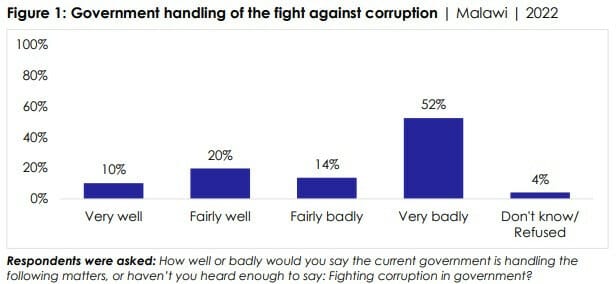
#AfricaBrief: The police are usually regarded as the most corrupt of significant institutions and leaders: According to 42 percent of Malawians, "most" or "all" police are corrupt, followed by the Malawi Revenue Authority (39 percent) and corporate leaders (38 percent )-2022 Afrobarometer Survey
MALAWI: According to the data, the majority of Malawians believe that corruption has increased in the last year.
The police continue to be at the top of the list of offices and institutions believed to be corrupt.
Furthermore, just a small percentage of Malawians believe they may disclose corruption to authorities without fear of punishment.
While the swift expulsion of cabinet ministers and government officials charged with corruption has overwhelming popular support, a thinner majority believes suspects who repay corruption proceeds should be offered amnesty.
Key findings
▪ Two-thirds (66%) of citizens say the government is performing “fairly badly” or “very badly” at fighting corruption (Figure 1).
▪ More than eight in 10 Malawians (83%) agree with the idea that cabinet ministers and government officials charged with corruption should be fired immediately (Figure 2).
▪ However, 57% of respondents say suspects who refund proceeds from corruption should be granted amnesty (Figure 3).
▪ Two-thirds (66%) of Malawians say that corruption has increased over the past year, including 57% who say it has increased “a lot” (Figure 4).
▪ Among key institutions and leaders, the police are most widely perceived as corrupt: 42% of Malawians say “most” or “all” police are involved in corruption, followed by the Malawi Revenue Authority (39%) and business executives (38%) (Figure 5).
▪ Almost eight in 10 Malawians (78%) say people risk retaliation or other negative consequences if they report corruption to the authorities (Figure 6).
Afrobarometer is a pan-African, non-partisan survey research network that collects and disseminates accurate data on African experiences and assessments of democracy, governance, and quality of life.
Since 1999, eight survey rounds in up to 39 countries have been completed. The ninth round of surveys (2021/2022) is now ongoing. Face-to-face interviews in the respondent's preferred language are conducted by Afrobarometer's national partners.
In February 2022, the Afrobarometer team in Malawi, coordinated by the Centre for Social Research, interviewed a nationally representative sample of 1,200 adult Malawians.
At a 95 percent confidence level, a sample of this size produces country-level results with a margin of error of +/-3 percentage points. Previous surveys in Malawi were done in 1999, 2003, 2005, 2008, 2012, 2014, 2017, and 2019.